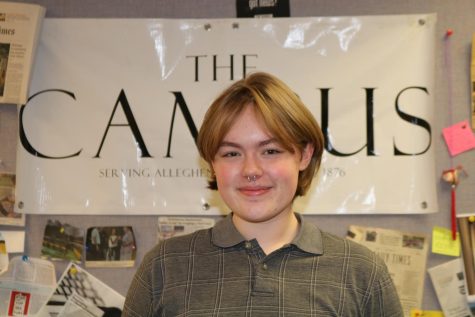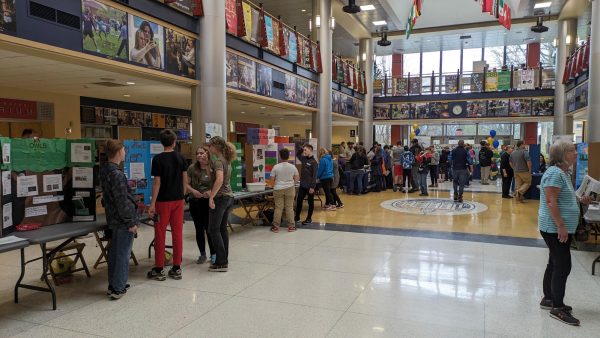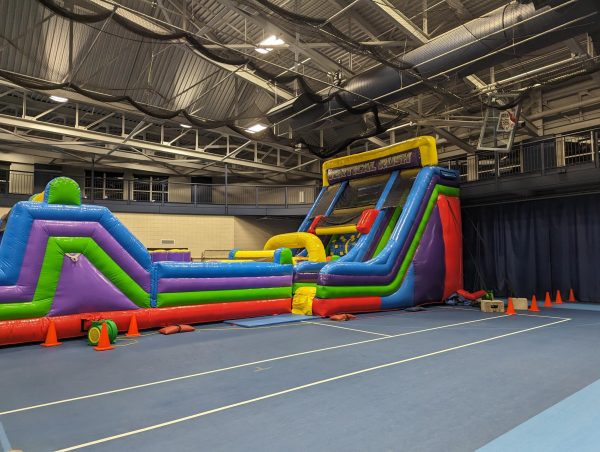DEEPly Sustainable Series combines sustainability, diversity and wellness
In classic liberal arts style, Allegheny is hosting a new collaboration project between the Dean of Diversity, Equity and Inclusion and the Office of Sustainability. The series of events, named “DEEPly Sustainable” after its aim toward “deep” and “intentional” work within the two offices, is a months-long project that brings students together through conversation, collaboration and do it-yourself workshops.
What started as a conversation between Director of Sustainability Kelly Boulton, ’02, and Dean of DEI Heather Moore Roberson quickly expanded into a multi-event series, and has come to include individual student ideas and student groups along the way.
“There’re so many intersections between sustainability and diversity, equity and inclusion and we haven’t always done a really good job on campus of exploring those explicitly,”” Boulton said.
To explore these intersections, the DEEPly Sustainable events are based in conversations on culture and the sustainable practices that make up those cultures.
“(The program) brings together a cross section of the student population that may not come to one event, but would come to another,” Roberson said. “It speaks to the beauty of intersectionality.”
On Sept. 26, students took fresh ingredients from the student-run Carr Hall Garden to make salsa in honor of Hispanic Heritage Month. Not only was this a tie back to sustainability, as the ingredients were sustainably and locally sourced right here on campus, but the food also led to conversations of culture and tradition among students.
Nathalie Paz Saucedo, ’25, is one student who has been involved from the start. After working in the Carrden over the summer and having conversations with Boulton, Paz Saucedo saw potential in the plants she was caring for daily. The vegetables in the Carrden reminded Paz Saucedo of family recipes, while herbs and flowers inspired ideas for sustainable body care products.
“It was pretty much me and (Boulton) going back and forth like, ‘Oh we can make this, we can make that,’” she said. “What can we do with everything we have and also acknowledge people that are here on campus that don’t get represented a lot?”
These conversations on sustainability and heritage tied back to culture, said Paz Saucedo.
“A lot of the practices Indigenous people use are sustainable by nature because we learn how to work with the land instead of against it,” she said.
Rotating crops seasonally and propagating new plants from those originally growing in the Carrden, for example, are sustainable practices based in Indigenous tradition.
When applicable, the DEEPly Sustainable events are designed to highlight the cultural heritage month in which they fall. Hispanic Heritage Month was the inspiration for one of September’s events, while Native American Heritage Month is the inspiration behind the November event. That event — which will take place in Grounds for Change at 5 p.m. on Nov. 10 — revolves around land acknowledgement.
“Culture and heritage is often linked to land, so as you depart from that connection to land, you lose a little bit of culture but you also lose a lot of sustainability,” Boulton explained.
Not only are sustainability and culture related, but both tie in to
conversations about wellness and identity. As Dean Roberson explained, “teaching people to care for themselves physically and internally; that is sustainability.”
In terms of providing the right ingredients for sustainable wellness practices, the Carrden comes in handy again.
“We want to make these quality products really available to students, regardless of where you shop or your socioeconomic status,” Boulton said.
With sustainable ingredients like herbs and flowers growing in the Carrden, it was a natural next step to prepare tea, decorations and body-care products for the coming months’ events. October, for example, features a DIY body-care session on the 28th, from 1-5 p.m. in Tippie B010. Dec. 9 will feature a gift-making session — at the same location and time — with these ingredients, in which participants will “create and give thoughtful gifts that are not based in consumerism and wasteful habits,” as Boulton described it.
While the events thus far have been led by the Offices of Sustainability and Diversity, Equity and Inclusion, Boulton and Roberson still hope to bring in other departments, clubs and educators to contribute to the program.
“Guest lectures, hands-on ‘DIY’ … the sky’s the limit as to what wecan do,” said Dean Roberson.
One of the upcoming events incorporates a lecture from writer and educator Bry Reed on the legacy of June Jordan, an activist and author on the topics of feminism and Black identity. This event — set for Dec. 1 — is designed as just one entry point to bring in more students and educators.
“We’re open, we’re considering the future of what (this program) could look like,” said Dean Roberson on adding new events to the program.
With the possibility of adding future educators and organizations to the project, paired with a variety of activities offered to engage all students, it is the hope of the creators that this series will carry on into the coming months.
“If this is something that we keep doing into the spring semester and then next year, this is a way for student groups that want to do programs to come pitch us ideas,” Boulton said. “It doesn’t need to be a top-down, we’re very much about collaborating and bottom-up ideas as well.”
With that in mind, students can not only attend the coming events for free, but contribute their own ideas as well. The four remaining events in place to wrap up the end of the year are designed to facilitate conversations on identity, culture and sustainability alike.

Sam Heilmann is a sophomore from Johnstown, PA. She is double-majoring in Communications and Environmental Science and Sustainability. This is her second...






